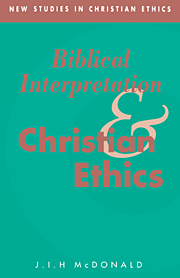Book contents
- Front Matter
- Contents
- General editor's preface
- Preface
- Abbreviations
- Introduction: Relating the Bible to Christian ethics
- Part One LIBERAL PRINCIPLES AND PRACTICE
- Part Two ESCHATOLOGY AND ETHICS
- Part Three PARTICIPATION IN MEANING
- Chapter 7 Ethics and historical interpretation
- Chapter 8 Ethics and contemporary reading
- Notes
- Select bibliography
- Index
Chapter 8 - Ethics and contemporary reading
Published online by Cambridge University Press: 22 September 2009
- Front Matter
- Contents
- General editor's preface
- Preface
- Abbreviations
- Introduction: Relating the Bible to Christian ethics
- Part One LIBERAL PRINCIPLES AND PRACTICE
- Part Two ESCHATOLOGY AND ETHICS
- Part Three PARTICIPATION IN MEANING
- Chapter 7 Ethics and historical interpretation
- Chapter 8 Ethics and contemporary reading
- Notes
- Select bibliography
- Index
Summary
So we listen to the text. But with whose voice does it speak? It is a text still, not a person. It has no voice of its own... The text is mute. So apart from the prior assumption, from the very outset, that something speaks through the text which called the text and myself into being, the text is cast into a swamp of total relativism, and interpretation is reduced to ventriloquy. So I repeat: in the text I hope to encounter an alien speech which is finally the self-disclosure of God.
(Walter Wink)We listen to the text: to the Other. With this observation we are brought back to Schweitzer, with his living Stranger; to Barth, with his insistence on the One who is qualitatively different from ourselves; and to Bultmann, with his emphasis on encountering the Word. As Ricoeur has emphasised, the text comes to us as the witness of the faith community to the object of its faith, so that as we engage with the text we hear the summons that it brings to us. In the text, interpreted with integrity, we find, not our mirror image, but a wholly different reality which relativises us, yet comes as a gift of grace.
But there is a difficulty. In order to listen to the text, we must overcome the fact that, at least for many, western scholarship has expropriated the Bible, so that many are no longer confident that they have access to its interpretation.
- Type
- Chapter
- Information
- Biblical Interpretation and Christian Ethics , pp. 200 - 246Publisher: Cambridge University PressPrint publication year: 1993



